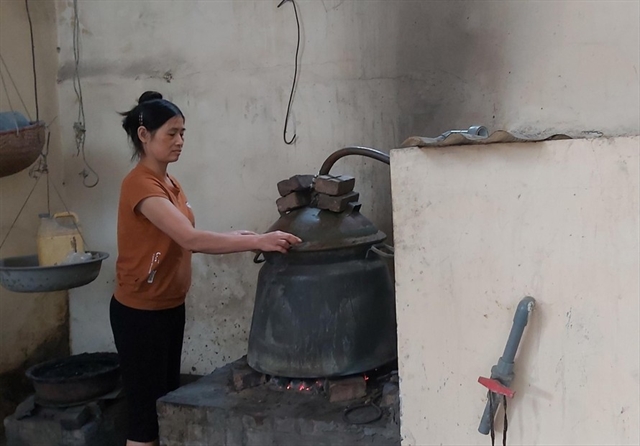 Society
Society

 |
| A rice wine cooking pot used by a villager in Phú Lộc Village. — Photo tienphong.vn |
HẢI DƯƠNG — Phú Lộc Village in Cẩm Giàng District, northern Hải Dương Province, is renowned for making rice wine.
But after police crackdown on drink driving, villagers have seen a drop in sales as customers rethink their drinking habits, forcing them to look for alternative ways to make a living.
The village, home to nearly 1,000 wine-making households, used to produce dozens of thousands of litres of wine per year.
Trần Văn Huy, an officer in charge of agricultural management of Cẩm Vũ Commune, said due to the COVID-19 impacts and the strict control over alcohol limit on drivers, wine is no longer consumed as much as before. Many villagers have recently abandoned the profession.
Huy’s family left the job a year ago. His sons and daughters moved to work at local factories while his wife stayed at home taking care of grandchildren and doing gardening.
“Rice wine cooking has been a tradition of this village. Some years ago before and after Lunar New Year holiday, the village’s roads were always crowded with vehicles carrying wine,” he told Tiền Phong (Vanguard) newspaper.
“The village is now quiet. We no longer smell sticky rice wine fermented with heirloom yeast,” he said.
He said Phú Lộc wine is fermented with the traditional yeast passed down by his ancestors. The yeast is made from milled rice, mixed with 21 types of herbs such as cinnamon, anise and liquorice.
The ingredients for making Phú Lộc wine include yellow flower sticky rice, a traditional variety of sticky rice planted in Kinh Môn and Kim Thành districts, Hải Dương Province, he said.
To get a quality product, the cook must carry out a process that lasts about 15 days and go through many stages: dry the sticky rice, grind it, remove the husk, do not pound it, cook the rice until it is soft, put it in a rice cooker and when it cools, put it in a basket, he said.
He continued: “The basket is lined with banana leaves. For every batch of rice, sprinkle a batch of crushed yeast, then fold and cover tightly with a sack, place the basket on top of the clay pot, and place it in a sheltered place."
After about five to six days, the yeast rice will smell fragrant. About half a litre of water will flow into the pot, then put it in a jar, add 15 litres of clean water, soak for another six to seven days before it is distilled, he said.
Vũ Đình Thuần, a 70 year-old villager, said thanks to wine cooking, he raised his three children who are now working as doctors at big hospitals in Hà Nội.
Before 2019, he cooked over 3,000 litres of rice per month. Each year he sold over 20,000 litres. But in this Lunar New Year’s season, he cooked only 1,000 litres each month.
“Making wine now does not bring profit, only to maintain production to earn money to raise pigs,” he said.
Hoàng Hữu Vương, owner of Phú Lộc Ltd Wine Company, said declining alcohol consumption results from the State's policy of tightening alcohol levels. In 2023, the company’s alcohol sales decreased by 40 per cent.
“We cannot expand the market. Even some of the company's traditional markets cannot sell the products," he said.
His company has switched to other business to make up for the losses.
Vương said that prohibiting vehicle drivers from using alcohol is a good regulation. According to the Government's report, the rate of traffic accidents due to alcohol use decreased during the recent Lunar New Year, which is a positive figure.
Phú Lộc villagers themselves do not have to witness their relatives have accidents or neighbours have quarrels after taking alcohol, he said.
Phú Lộc villagers also agreed that changing livelihoods is an inevitable trend. With many industrial parks being opened, more young people are entering factories to work, which is an adaptive and sustainable direction.
Đào Đức Thanh, deputy chairman of Cẩm Vũ Commune People’s Committee, said: “The fact that monitoring driver’s alcohol concentration has an impact on traditional craft villages is difficult to avoid. Abandoning wine cooking doesn't have much impact on villagers’ lives. Young people all go to work at factories, while the old people take care of gardens, so people's lives are still stable." — VNS




